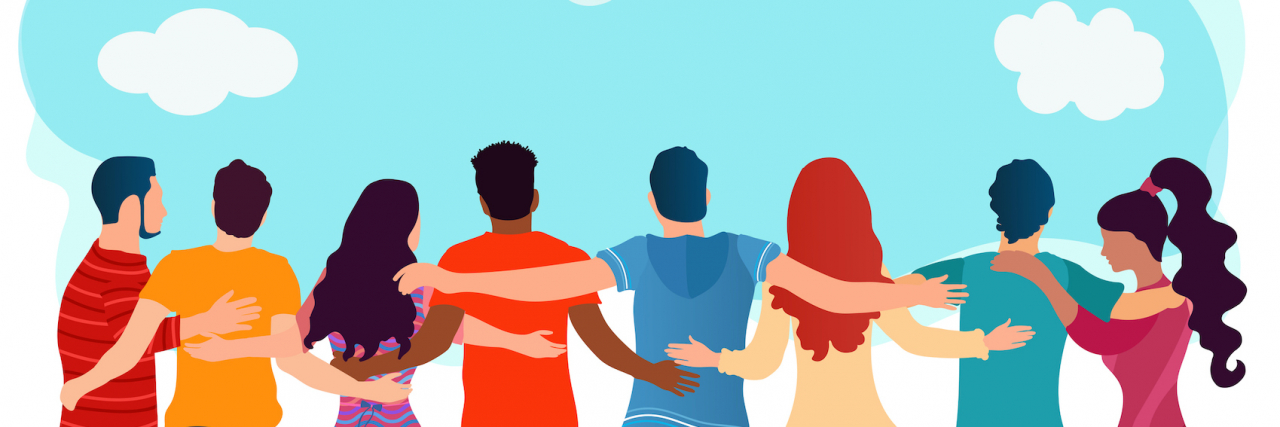All kinds of people need help and get the help they need: from 5 years old to 100, religious leaders, health care providers, college students, white, Black, Native American, Indian, Asian, Hispanic, parents, children, grandmothers, grandfathers, farmers, teachers, cowboys, construction workers, veterans, people with substance abuse problems, people who love to workout, people who like to tell jokes, people who seem to have large families and support systems, people who seem to have little to no support, Republicans, Democrats, Christians, Catholics, Pentecostals, Evangelicals, Wiccans, atheists, gay, straight, transsexual, people who are married, people who are divorced, rich, poor, people who are retired, disabled, abled, quiet, shy, loud, confident, homeless, home owners, foster kids, kids from traditional two parent homes, people with designer bags, people who wear rock t-shirts, people who wear ties, all kinds of people from all walks of life.
This tells me, and I want to tell others, the most important thing one should know when coming into a mental health clinic: You are not alone. Whoever you are, there is someone out there like you that is coming too. Many people are scared and nervous to come to the clinic, especially for the first visit. I think many people are worried about being judged and feel like they don’t belong here. The mental health clinic isn’t a place of judgment. Everyone belongs and is welcome. Mental health conditions don’t discriminate; they affect every type of human in existence.
How has knowing this affected my personal journey with depression and anxiety? I feel more normal than ever before. I feel more capable of taking care of myself. I feel empowered. I feel more normal because, again, all kinds of people come in. I am not as weird as I thought I was…I’m still kind of weird, ha, but not in a way that makes me ask myself “what is so wrong with me?” After talking to and helping others with their mental health conditions, my own condition has been normalized in my thought pattern. I no longer struggle with feeling worse about my depression and anxiety because I have depression and anxiety.
This is a common downward spiral of thinking that many people with various mental health conditions have. We don’t want to feel this way and feel worse for feeling the way we do, then feel worse, and worse and worse. It helps to know I am actually pretty “normal” when comparing myself to real people. I have read the statistics that 41.5 percent of adults have had symptoms of anxiety and depression, but meeting these adults in person and hearing their stories has impacted me much more than knowing a statistic.
Another statistic that seems less real than reality is that 1.38 million people attempted suicide in 2019, according to the American Foundation for Suicide Prevention. This is how many attempted; the number of people that have had the thought is not on record. I know it’s a lot. So many people have thoughts of suicide that you may find it hard to believe, all types of people. Not everyone that comes in to the clinic where I work has suicidal thoughts, but a lot do (see the beginning of this story). Someone from all those groups probably had a suicidal thought once over the last year.
The hardest part about having this thought is thinking it alone. The best thing to do is to talk about it. It is therapeutic to say it out loud, to share it with someone, and work through it. Most people, however, are ashamed, afraid to be judged or forced into a locked psychiatric unit. Just because someone has a suicidal thought, they aren’t necessarily suicidal. Therefore, it may not be necessary to be sent to an inpatient psychiatric facility, but the thought should still be taken seriously. Something is going on, healing is needed, but healing won’t come by holding it all inside. Normalizing the conversion would help. People need to know they are not only 1 in a million special, but 1 in millions who have similar thoughts and healing needs.
It is a privilege and an honor to be trusted with people’s inner most secret thoughts of self-harm and suicide. I love helping others. In return, it helps me. Learning how to help others empowers me to help myself more. Encouraging the capability of others helps me be more capable. Outside of a clinic or healthcare setting, there are lots of ways for people to have similar experiences as I do.
For example, there is the Out of the Darkness Walk, put on by the American Foundation for Suicide Prevention. These walks happen in hundreds of cities in all 50 states to raise awareness and funds for suicide prevention. Suicide prevention hotlines need volunteers. I would suggest a Google search to find a hotline and make sure they provide you with training. You can share your story or thoughts with others here at The Mighty, and/or read the stories and thoughts of other people that face similar challenges.
Reach out. Don’t be alone. You need others and others need you. We can be here for each other. There are lots of us.
Getty image by melitas

